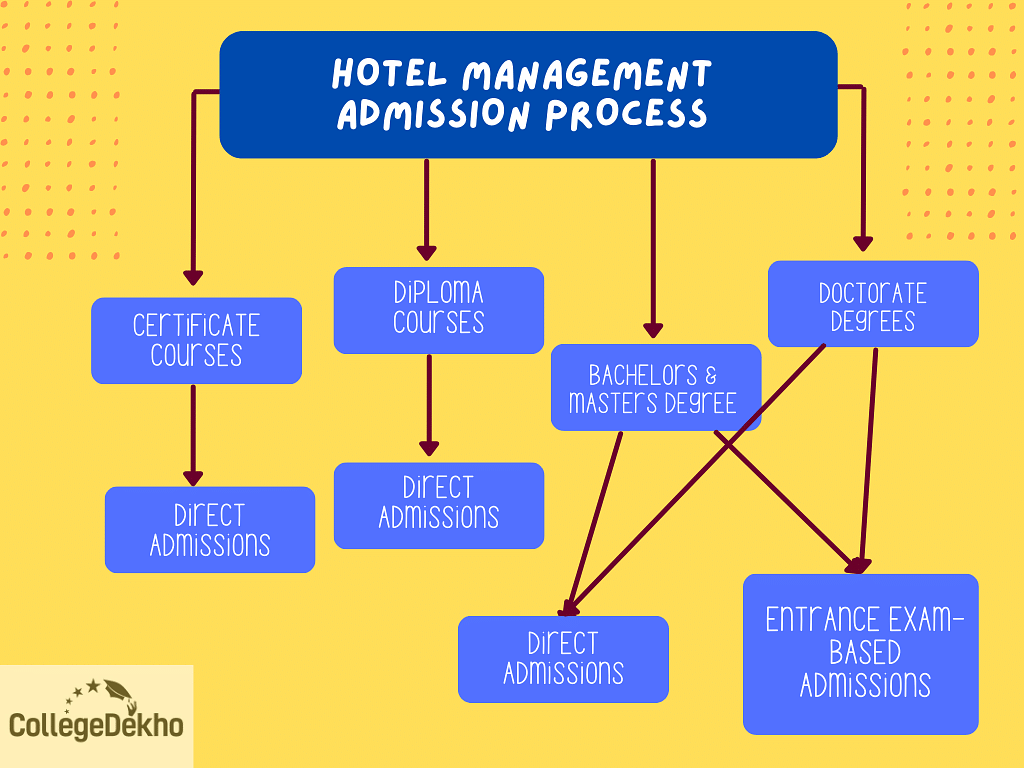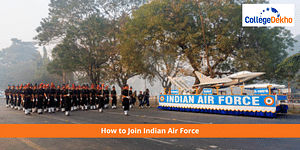Hotel Management
Hotel Management course is offered at various academic levels — certificates, UG & PG diplomas, bachelor’s, master’s, and PhD, spanning between three months to four years. After completion of the programme, graduates can work in various industries and job roles including hotel manager, Hospitality Executive and Catering Officer, etc. with a decent starting salary.
Hotel Management Course Overview
Hotel Management courses are professional academic programs offered by different colleges and universities at various academic levels based on their requirements. To be eligible for admission, candidates must score at least 45%-60% aggregate marks in class 10 and class 12 exams. Some popular entrance exams for these courses are NCHMCT JEE, AIMA UGAT, AIHMCT WAT, etc. The hotel management syllabus & subjects have been designed in such a manner that students from any stream can easily adjust to the course curriculum. Furthermore, hotel management admissions are accepted based on merit as well as entrance tests.
A diploma in the field is another popular industry-based training program for those who need to find work immediately after completing the course. IHM Pusa, IHM Bangalore, and IHM Kolkata are among the best hotel management colleges in India with a course fee ranging between INR 30,000 and 10,00,000. After completing the course, students can pursue various hotel management career opportunities such as a Chef, Hotel Manager, Executive Chef or Baker, Hospitality Executive and Catering Officer, or Hospitality Executive or Catering Officer. The typical starting hotel management salary in India ranges between INR 4.1 LPA and INR 6.2 LPA.
Table of Contents
- Hotel Management Course Overview
- Hotel Management Course Highlights
- Why Choose a Hotel Management Degree?
- What is an Online Hotel Management Degree?
- What is the Difference Between Hospitality and Hotel Management Course?
- Types of Hotel Management Programs
- Hotel Management Course Eligibility Criteria
- Hotel Management Course Entrance Exams
- List of Popular Hotel Management Course Specialisations
- Hotel Management Course Admission Process in India
- Direct Hotel Management Admission Process Without Entrance Exam
- Hotel Management Course Fees in India
- Hotel Management Syllabus/Subjects
- Top Private Hotel Management Colleges in India
- Top Government Hotel Management Colleges in India
- Top Hotel Management Colleges Offering Direct Admission in India
- Career Options After a Hotel Management Course
- Courses After Hotel Management
- FAQs about Hotel Management
Hotel Management Course Highlights
The following table shows some important hotel management course highlights:
| Particular | Detail |
|---|---|
| Course Name | Hotel Management |
| Level of Programme & Duration |
|
| Exam Type | Semester-wise |
| Qualification Required | For bachelor’s degree: At least 45% to 50% aggregate marks in 10+2 from a recognised university. Or, For master’s degree: At least 55% to 60% aggregate marks in undergraduate studies from a recognised university. |
| Average Salary | INR 2.5-12 LPA |
| Average Course Fees | INR 30,000-10,00,000 |
| Selection Process | Merit + Entrance Exam |
| Entrance Exams | NCHMCT JEE, AIMA UGAT, AIHMCT WAT, etc. |
| Career Prospects | Hotel Manager, Catering Manager, Front Office Manager, Conference Center Manager, and more. |
| Top Recruiters | The Taj Group of Hotels, Hyatt Hotels, ITC Group of Hotels, Marriott International, The Leela Palace, and so on. |
Why Choose a Hotel Management Degree?
A degree in hotel management combines day-to-day commercial activities with customer service tasks. Let us discover some top reasons that attract people to pursue this in-demand hotel management course with the help of the infographic given below.
.png)
Early Accountability: Fast growth, on-the-job training, and prospects for career advancement are all compelling reasons to consider a career in hotel management. Hiring employees, managing budgets, handling public relations, and setting sales goals are all part of a hotel manager's job.
Diversity: Working for an individual business or chain hotel, becoming a general manager or managing certain departments, and working in a range of places such as metropolitan cities or seaside areas are all possibilities.
Job Satisfaction: Given that your job as a hotel manager is about people, you must be a people person. Knowing that you have done this through positive feedback and favourable ratings will give you a tremendous sense of job satisfaction and will motivate you to achieve even better results.
Creativity: To thrive and grow, hospitality and tourist businesses require innovative people. To be a successful hotel manager, you must be able to generate and implement new ideas regularly, such as themed afternoon teas or guided tours, to improve the service you give.
Opportunity to Travel: Opportunities in hospitality, travel, and tourism, including hotel management, exist in countries worldwide. Working as a manager for a large chain hotel will allow you to travel not just locally and domestically, but also internationally.
What is an Online Hotel Management Degree?
A practical and adaptable approach to expand your expertise or build up new hotel management skills is through an online degree in the hotel management course. In the upcoming years, the hotel sector in India has the potential to expand at an exponential rate. The e-Visa program's extension is also anticipated by the sector, which believes it will triple the number of visitors to India. One of the industries in India that is expanding is the hospitality sector. If you can improve your skillset through this schooling, an online degree in this field could be well worth it.
What is the Difference Between Hospitality and Hotel Management Course?
Hotel management, as the name suggests, is responsible for managing all aspects of a hotel's operations. It contains instructive strategies for management that can be applied to a variety of fields, including cleaning, hotel administration, maintenance, marketing, and catering. Nonetheless, people are the centre of attention in hospitality administration. One can find hospitality outside of hotels as well as within them. This profession employs specialists from several multinational corporations (MNCs) and larger IT companies to handle guest meetings, arrivals, lunches, and departures while on their site. The main distinction between hospitality and hotel management courses is illustrated in the following table.
| Particular | Hospitality Management Course | Hotel Management Course |
|---|---|---|
| Average Annual Fees | INR 50,000-6,00,000 | INR 30,000-10,00,000 |
| Duration | 2 to 3 years | 3 months to 6 years |
| Eligibility | At least 45-50% aggregate marks in 10+2 from a recognised board | At least 50%-60% in 10+2 from a recognised board |
| Admission Criteria | Merit + Entrance Exam | Merit + Entrance Exam |
| Entrance Exam | CMAT, NCHMCT JEE, LPUNEST, NMAT, etc. | NCHM JEE, IPU CET, UPSEE, GNIHM JET, and more. |
| Emphasis On | People management | Operations management |
| Area of work | Solely focused on the operation of the hotel sector | A catch-all word covering a variety of sectors, including food & beverage, travel, event planning, and more. |
| Average Starting Salary | INR 1-7 LPA | INR 2.5-6 LPA |
Types of Hotel Management Programs
One of the most prognosticated programmes after 12th grade is in the field of hotel management. These courses are provided at different academic levels and are offered to prospective candidates in all three modes of learning — full-time, part-time and online/distance schooling. The various types of hotel management courses are discussed below:
Full-Time Hotel Management Courses
Full-time on-campus attendance is required of students, as are consistent assignment completion and semester-by-semester offline assessments. As part of the course prerequisites, they also have to engage in practicals and deliver projects. Additionally, by actively interacting with their teachers and fellow students, they learn advanced topics and acquire real-world experience in the field.
Part-Time Hotel Management Courses
A part-time course is available for candidates who are unable to commit to the regular programme or who are employed full-time in their current positions. The duration of the part-time programme varies depending upon the type and level of the programme.
Distance/Online Hotel Management Courses
As with the part-time course, distance/online programmes can be taken at any time and from any location (if permitted) depending upon the type and level of the programme. This course is designed for students who are working professionals and who cannot attend full-time or even part-time courses. This course is offered by colleges such as Acharya Nagarjuna University (ANU), Indira Gandhi National Open University (IGNOU), Yashwantrao Chavan Maharashtra Open University (YCMOU), Guru Nanak Institute of Hotel Management (GNIHM), and more.
Hotel Management Course Eligibility Criteria
The following table summarises the general admission or eligibility requirements for students interested in studying hotel management courses in India:
| Course Type | General Eligibility Criteria |
|---|---|
| Certificate | Candidates must have completed (or pursuing) class 12th in any stream of choice from a recognised board. |
| Diploma | Students must have completed their class 12 from a recognised board in any stream of choice. Admissions are majorly based on a first come first serve basis. |
| Undergraduate | Applicants must have cleared class 12 from a recognised board in any stream with at least 50%-60% aggregate marks and qualifying entrance exam scores. |
| PG Diploma | Candidates must have a bachelor’s degree in any relevant field of study from a recognised university. However, some universities may ask applicants to sit for entrance exams. |
| Postgraduate | Aspirants must have a bachelor’s degree in any other relevant field of study from a recognised university with at least 50%-60% aggregate marks along with qualifying entrance exam scores. |
| Doctorate/PhD | Students must have a master’s degree in any other relevant field of study from a recognised university with at least 60% aggregate marks along with qualifying entrance exam scores and some practical job experience. |
Required Skill Set for Hotel Management Course
Gaining a variety of job-specific skill sets can help people advance in their careers and is necessary for a career after completing hotel management courses. The following qualities are necessary in the hotel management industry:
Analytical Skills: Most visitors might not even let the hotel know what they need; instead, they might be flexible. Therefore, even with the lack of direct communication from the customer, applicants must understand what they want and prefer.
Practical Intelligence: Situational awareness and the capacity to anticipate problems are the only ways to deal with adverse situations and problems. Candidates enrolled in a hotel management course benefit from internships that give them hands-on expertise in the workplace.
Teamwork: It is essential to running a hotel or resort. Different teams oversee the front desk, room service, kitchen, and other areas of a hotel. Every team ought to be able to cooperate and support one another's activities.
Multitasking: Should an unexpected circumstance prevent someone from completing their work, all hotel employees must be prepared to jump in and complete the task at hand. Hotel managers must be multitaskers because problems typically arise in clusters rather than one at a time.
Cooking Techniques: Students learn various cooking techniques and cuisines in the hotel management course curriculum. They receive instruction in both the theoretical and practical aspects of cooking.
Excellent Interaction: Being able to interact professionally and clearly in conversation, writing, and body language is essential for hotel managers who want to provide outstanding customer service. For this reason, whenever you speak with your guests, you should be friendly and attentive.
Resilience: Those new to the hospitality industry need to understand that this is not a career for the timid. Due to regular multitasking, a lot of rushing back and forth, and sometimes impatient clients or coworkers, you will typically need to manage increased levels of stress to get through a shift.
Flexibility: Working in the hospitality industry often demands a knack for managing unpredictability. Your shifts may vary often, you may be called upon to complete unforeseen jobs around the office, and you may encounter consumers who exhibit behaviours or requests that you need help with.
Hotel Management Course Entrance Exams
The majority of well-known universities use entrance exam results to shortlist applicants for their Hotel Management programmes. Students will be asked questions on topics including numerical ability and analytical aptitude, reasoning and logical deduction, general knowledge and current affairs, and English language proficiency in these entrance exams for hotel management courses. The following is a list of some recognised hotel management exams that are administered in India:
- IHM Aurangabad Entrance Exam
- MAH MHMCT CET
- Christ University Entrance Test
- Oberoi STEP
- NCHM JEE
- AIMA UGAT BHM
- IPU CET
- GNIHM JET
- AIHMCT WAT
List of Popular Hotel Management Course Specialisations
There are many different hotel management courses available, but we have selected the top ones for all aspiring students here. Take a look:
| Specialisation Name | Description |
|---|---|
| Fast Food Joint Management | If candidates possess the requisite financial, managerial, and industry skills, they can potentially operate a profitable fast-food restaurant or chain of restaurants. |
| Cruise Ship Hotel Management | To obtain experience, graduates must spend five to seven years working under the supervision of other chefs on cruise ships. As one of the most sought-after careers, cooking is something that many chefs like to pursue. This line of work offers the opportunity to travel and network with new individuals. |
| Airline Catering and Cabin Services | Airlines hire cooks to prepare meals during long flights. Many hotel management course graduates believe that being a cook is an excellent career choice, even though they are ill-prepared for travel. The service, in addition to the manner of delivery, is essential. |
| Catering Departments in Railway, Armed Forces, and Ministerial Conventions | Serving top ministers and gazetted officers food is always a pleasure. It is a source of delight in and of itself to plan such large parties and serve these notable individuals. |
Hotel Management Course Admission Process in India
In many colleges, admission to hotel management courses is typically based on merit. For instance, to get admission to a diploma programme; previous academic performance is considered when deciding whether to admit a candidate. Candidates are shortlisted for admission based on their performance in the previous year's examination. For admission to hotel management courses, some colleges, however, only accept entrance exams. The following infographic highlights a brief hotel management admission process in India.

Certificate: There is no set admission process for certificate courses, but students who have completed class 10+2 will find it easier to get admission to Hotel Management certificate courses.
Diploma: The admission process is applying to hotel management institutes that provide diploma programmes and registering for admission by giving academic information (passing class 10th or 12th is mandatory).
Bachelor’s and Master’s Degree: A candidate with a 10+2 merit of 50% (for bachelor’s) and merit of 50% in any bachelor's Hotel Management courses is qualified for admission to bachelor's degree programmes in Hotel Management, either directly or through entrance tests.
Doctoral: A candidate with at least a 50% aggregate mark in any master's course in hotel management must pass an entrance exam to be admitted to the PhD programme. All PhD programs in India, including those provided by institutions of hotel management, are admitted through the CSIR UGC NET entrance exam.
Direct Hotel Management Admission Process Without Entrance Exam
Many individuals who aspire to work immediately after the completion of hotel management courses look for colleges that provide direct admission, which does not require entrance tests. Nevertheless, direct hotel management admission, which does not require an entrance exam, differs from institution to college. As a result, the qualifying exam will be the only consideration in the selection process.
Prospective aspirants of the HM course should visit the official website of their chosen institution to learn more about the admissions procedure. Students must adhere to the college's or institution's policies when they attend the in-person interview after submitting their application. It should be noted that only a few colleges will conduct in-person interviews; instead, candidates may choose to use Google Duo or Skype. Upon being chosen for your desired HM programme, you may validate your admittance by covering the entire first-year tuition fee.
Hotel Management Course Fees in India
Hotel management course fees for different programmes and levels of study can range from INR 50,000-18,00,000 p.a. The fees are even lower than this in many government colleges. Having said that, the programme fee depends on various factors like the course level, type of college/institution, level of specialisation, location, and more. The estimated fees for HM courses in India at various levels of study are as follows:
| Course Type | Average Fees (Approx. in INR) |
|---|---|
| UG/PG Certificate in Hotel Management | 1,000-3,50,000 |
| Diploma in Hotel Management | 1,000-6,00,000 |
| Bachelors in Hotel Management (BHMCT, BHM, BSc Hotel Management & Hospitality) | 50,000-5,00,000 |
| 50,000-14,00,000 | |
| Masters in Hotel Management (MHM, MTHM) | 40,000-5,00,000 |
| PhD in Hospitality | 30,000-7,00,000 |
BA in Restaurant Management
The three-year, full-time BA in Restaurant Management programme trains students to supervise the daily restaurants, operations of bars, and other food-related businesses. They might consider a career as a food service manager at many types of restaurants or as a restaurant owner. Certain courses combine restaurant management training with hospitality training, which typically includes classroom instruction at hotels and resorts. Aspirants can gain practical experience through internships, hands-on projects, industrial collaborations, etc.
Hotel Management Syllabus/Subjects
The HM syllabus varies from one college to another. Apart from this, the subjects taught in any course offered in this field are also dependent on the degree that is offered to candidates upon completion of the course. Mentioned below are the hotel management syllabus and subjects:
- Business Accounting
- Business Finance
- Business Mathematics
- Business Organisation
- Communication and Soft Skills
- Culinary History
- Food Production and Patisserie
- Front Office Management
- Fundamentals of Travel and Tourism
- Hierarchy of Department and kitchen
- Kitchen Operations Management
- Marketing in Tourism and Hospitality Industry
- Marketing Management
- Nutrition and Dietetics Management
- Wines Fundamentals
Top Private Hotel Management Colleges in India
Candidates who wish to work in the hospitality sector — which includes resorts, hotels, and tourism — generally take HM courses after 12th grade. The IHM institutions are the best option for those looking to attend government colleges. Those interested could look over the list of well-known government colleges that offer affordable hotel management courses below.
| College Name | Average Annual Fees (Approx. in INR) |
|---|---|
| IHM Mumbai | 3,00,000 |
| IHM Kolkata | 50,000-3,00,000 |
| IHM Hyderabad | 2,00,000-3,00,000 |
| IHM Bhopal | 2,00,000 |
| IHM Shimla | 28,000-2,00,000 |
| IHM Lucknow | 32,000-2,00,000 |
| IHM Kovalam | 2,00,000 |
| IHM Delhi | 73,000-2,00,000 |
| IHM Chennai | 15,000-2,00,000 |
| Dr Ambedkar Institute of Hotel Management, Catering and Nutrition Chandigarh | 50,000-2,00,000 |
Top Government Hotel Management Colleges in India
The following table lists the top government colleges in India that offer inexpensive hotel management courses:
| College Name | Average Annual Fees (Approx. in INR) |
|---|---|
| WGSHA Manipal | 5,00,000-14,00,000 |
| SRM Institute of Hotel Management, SRM Institute of Science and Technology, Chennai | 53,000-2,00,000 |
| School of Hospitality and Tourism Studies, Padmashree Dr D.Y. Patil Vidyapeeth, Navi Mumbai | 50,000-9,00,000 |
| M S Ramaiah University of Applied Sciences | 7,00,000 |
| Christ University | 6,00,000 |
| Chandigarh University | 40,000-4,00,000 |
| Banarsidas Chandiwala Institute of Hotel Management and Catering Technology | 5,00,000 |
| Ashok Institute of Hospitality and Tourism Management | 36,000-3,00,000 |
| Army Institute of Hotel Management and Catering Technology | 7,00,000 |
| Amity University, Noida | 7,00,000-8,00,000 |
Top Hotel Management Colleges Offering Direct Admission in India
The following table outlines a list of popular colleges that offer direct admission to hotel management courses without requiring students to sit for an entrance exam:
| College Name | Course Offered | Average Annual Fee (Approx. in INR) |
|---|---|---|
| University of Technology, Jaipur | Master of HM | 50,000 |
| SUN International Institute for Tourism & Management, Hyderabad | Post Graduation Diploma in HM | 1,71,000 |
| Siksha 'O' Anusandhan University, Bhubaneshwar | Bachelor of HM and Catering Technology | 78,000 |
| Shyam University, Dausa | Master of HM | 80,000 |
| Quantum University, Roorkee | Bachelor of Hotel Management | 83,000 |
| Jindal School of Hotel Management, Vadodara | BBA in Hotel & Tourism Management | 2,40,000 |
| Indian Institute of Hotel Management, Kolkata | Master of HM | 87,500 |
| Graphic Era University, Dehradun | Master of HM | 55,600 |
| DSM School of Management, Kolkata | Bachelor of HM | 70,000 |
| Ansal University, Gurgaon | Bachelor of HM | 2,72,000 |
Career Options After a Hotel Management Course
Working in the HM profession is a lot of fun, from exploring new places to meeting new people every day. This is because hotels, resorts, and lodges are spread all over the world, you can work anywhere you desire. The HM chain is expanding rapidly as a result of globalisation. According to the latest stats by the Institute of Hotel Management (IHM), career options in this field are anticipated to rise by 25%. The following is a discussion of the HM career options.
Top Job Profiles for Hotel Management Course Graduates
A candidate with a degree in HM has a wide range of job profile options to select from across numerous industries. The following are some examples of popular job profiles:
- Sommelier
- Restaurant Manager
- Marketing and Public Relations
- Kitchen Chef
- Event Coordinator
- Hotel Manager
- Front Desk Officer
- Conference Organiser
- Catering Manager
- Casino Host
- Cabin Crew
Top Hotel Management Recruiters in India
Without question, HM and the hospitality business provide tremendous employment opportunities for a motivated student. Hotel Management and Hospitality is a significant industry in India's service economy. According to estimates, the travel and tourism business in India employs more than 8% of the entire workforce. Here are some top recruitment firms in India for HM course graduates:
- The Taj Group of Hotels
- The Residency Group of Hotels
- The Marriott
- The Lalit
- Shangri-La Hotels and Resorts
- Praxis Services
- Oberoi Group of Hotels
- Novotel
- Jaypee Group of Five-Star Hotels and Resorts
- ITC Hotels
- Indian Hotels Company Limited
- Accor Hostels
Salary After Hotel Management Course
Depending on the type of degree you obtain, there are various career options available, with plenty of job opportunities that come with a good hotel management salary in India. The following table lists the salaries for some of the most sought-after job profiles in this industry:
| Job Profile | Average Salary (Approx. in INR) |
|---|---|
| Kitchen Chef | 3-5 LPA |
| Hotel Manager | 4-12 LPA |
| Front Desk Officer | 1.5-3.5 LPA |
| Catering Supervisor | 4-6 LPA |
| Cabin Crew | 3-10 LPA |
However, the starting salary for a hotel manager in India is INR 4.50 lakhs per year, with a hotel manager considered to be the top job prospect. In their later years (15 to 20 years of experience), hotel managers can expect to make between INR 10-20 LPA.
Courses After Hotel Management
Postgraduate studies can be pursued to move into a similar field like marketing or human resources or to specialise in a specific area of hospitality like international hospitality, tourism, hotel, or events management. A study or work placement overseas is a requirement for certain postgraduate courses. Do your homework and weigh the advantages of credentials over experience as well as the preferences of the targeted employers before selecting whether to enrol in a postgraduate programme. Students can choose any one of the following hotel management courses to opt for after completing their bachelor’s degree:
- Postgraduate Diploma in Hotel Management
- Postgraduate Diploma in Hospitality Management
- Master in Tourism and Hotel Management
- Master in Hotel Management and Catering
- Masters In Hotel Management (MSc)
- Masters in Hotel and Restaurant Management
- Masters in Hospitality and Hotel Management
- Master of International Hotel Management
- Master in Tourism Marketing and Hotel Revenue Management
- Executive Master in Management of Hotel Companies
FAQs about Hotel Management
What exactly do hotel management course graduates do?
A hotel management course graduate performs numerous responsibilities such as strategic leadership, effective management, and day-to-day supervision of a hotel. There will be no shortage of job prospects available to you upon graduation with a degree in hotel management. You can apply for different jobs in your preferred department by choosing from those in the hotel industry, which is divided into multiple categories like front office, food and beverage, security, operations, accounting, etc.
What are the different types of Hotel Management courses?
Different types of Hotel Management courses include certificate, diploma, bachelor’s, PG diploma, master’s, and doctoral. The following is a list of the same:
- Diploma in HM
- Post Graduate Diploma in HM
- Bachelor of Hotel Management (BHM)
- BA in HM
- BSc in HM
- BA (Hons) in HM
- BBA in HM
- MSc in HM
- MBA in HM
- PhD in Hospitality
- Certificate Courses in Hotel and Catering Management
Is a hotel management course degree worthwhile?
Yes, a hotel management course degree is worthwhile and is one of the most demanding among students given its promising career prospects. It gives graduates various options and qualifies them for numerous prestigious, exciting job descriptions that can lead to a highly successful career. In a nutshell, obtaining a degree in this field is beneficial for people who genuinely want to work in the hospitality sector.
Are there scholarships available for obtaining hotel management course certifications?
Yes, several scholarships are available for obtaining hotel management course certifications which are offered to eligible candidates by various universities and colleges. In addition to allowing individuals to enrol in the academic programmes of their choice, several online learning platforms provide financial aid and scholarships to qualified applicants. To check whether their desired institution offers any scholarships, prospective students should visit its official website.
What is the hotel management course syllabus?
The hotel management course syllabus includes critical topics such as Accommodation Management, Accounting for Managers, Basics of Hotel Operations, Communication & Information Technology, Environmental Science, Food and Beverage Management & Control, Food Production Management, Front Office Management, Hospitality Sales and Marketing, Hotel Accounts and Financial Management, Industrial Training, Introduction to Travel - Tourism Industry, Marketing Management, and more.
Is the hotel management course the same as the hospitality management course?
No, the hotel management course is not the same as the hospitality management course. Hospitality is a broader notion than hotel management, which handles every facet of the hotel's operations. Tourism and hotel management encompass all service sectors, including food and beverage, accommodation, and event planning.
Are hotel management course subjects hard to study for an average student?
No, hotel management course subjects are not hard to study for an average student, especially for those who are passionate about the industry. This is an amazing profession to work in if you appreciate travelling and being part of a driven and exciting team. Applicants who have a passion for cleaning and cooking are welcome to follow this career path.
What is the aim of a hotel management course?
The aim of a hotel management course is to provide students with various skills and knowledge that contribute to the efficient running of the hotel business. It includes marketing, hospitality, management, guest relations, and more. Students who enrol in this course will learn about the nuances of the business, including sales and marketing, front-office administration, and service.
What is the starting salary for a hotel management graduate?
The starting salary for a hotel management graduate ranges from INR 1.8-2.4 LPA or INR 15,000 to 20,000 per month on average. Professionals working in five-star or luxury hotels also make a lot of money in tips and bonuses. Mid-level professionals in various departments earn between INR 5-10 LPA, while senior-level incomes range from INR 12-82 LPA.
What is the duration of a Hotel Management degree course?
The duration of a Hotel Management degree course is determined by the programme mode. An undergraduate programme lasts 3 to 4 years, whereas a postgraduate programme, diploma, or certificate course in hotel management lasts 2 years, 6 to 12 months, or less than a year.
How much is a hotel management course fee in India?
A hotel management course fee in India is determined by the institution you choose to enrol in the programme. There are many online certifications available, some of which are even free, but typically a course in this field (whether it be a diploma, bachelor's, master's, or just a certification) can cost anywhere between INR 3,000 to 1,00,000.
What are the different types of hotel management specialisations?
Some most trending and sought-after different types of hotel management specialisations are as follows:
- Catering Technology
- Hotel Administration
- Front Office & Accommodation Management
- Culinary Arts
- Hospitality Studies
- Hospitality, Travel, and Tourism
Can I study a hotel management course online?
Yes, candidates can study a hotel management course online based on their preferred type of programme and desired institution. All that is available online, though, is the theoretical side of hotel administration. Skills such as cooking, cleaning, and other things can only be taught through a training-based curriculum, like a diploma or degree course.
Is hotel management a good career option to choose?
Yes, hotel management is a good career option to choose and a wise decision to make. There are numerous work options accessible as this industry is flourishing in India. Thus, it is one of the most sought-after courses, as well as one of the highest-paying occupations.
After hotel management, am I able to become a chef?
Yes, students can become chefs after studying hotel management. One can also enrol in a variety of certificate, diploma, undergraduate, and postgraduate programmes to become a chef, including the BSc in Hospitality and Hotel Management, the BSc in Catering Science and Hotel Management, the Certificate in Food Production and Patisserie, the PG Diploma in Culinary Arts, and the BA in Culinary Arts, among others.
Does a hotel management course admission require a Math background?
No, a hotel management course admission does not require a Math background. Higher secondary school does not require maths for careers in hotel management, although many positions in this field include working with customers. Candidates enrolled in this course gain industry-specific knowledge and abilities in areas such as hygiene, food safety, and hotel economics.
How long does it take to become a hotel manager?
The duration related to how long it may take to become a hotel manager depends upon your skills, expertise, etc. A Bachelor of Science in Hospitality Management (BSHM) programme teaches students how to conceptualise, plan, develop, manage human resources, and oversee various aspects of hotel, restaurant, and resort operations.
What programme is the best for admission to hotel management courses?
The following programmes are the best for admission to hotel management courses:
- Bachelor of Hotel Administration (BHM)
- A Bachelor's Degree in Hospitality Management and Culinary Arts (BHMCT)
- BSc in Hospitality and Hotel Management
- BA Hotel Management
- BBA in Tourism, Travel, and Hospitality
Can hotel management be done after completing graduation?
Yes, hotel management be done after completing graduation. After completing your bachelor's degree with at least 45% marks, you can apply for post-graduate programmes. Some of the best schools in India admit students based on PG entrance exams followed by a GD/PI round.
Can I study hotel management courses after 10th grade?
Yes, students can study hotel management courses after 10th grade. Diploma in Hotel Management, Diploma in Hotel and Hospitality Management, Diploma in Hotel Management and Catering Technology, Diploma in Food and Beverage Production, and other top courses are available.
What is the full form of HM?
The full form of HM is Hotel Management, which is the study of professional hotel administration and catering. As the number of tourists visiting the country grows, so does the expansion of the Hotel Management industry, and at this rate, it will exhibit even greater growth in the years to come.
Is hotel management a good career option?
Yes, hotel management is a good career option for students that can provide them with the growth they desire in their professional careers. The hospitality industry provides a remunerative job that is sufficient to cover your expenses while also providing opportunities for future growth.
Can I opt for hotel management courses after 12th grade?
Yes, students can opt for hotel management courses after 12th grade from a recognised board with at least 50% aggregate marks. The course will teach candidates both the practical and theoretical aspects of hotel and catering management.
What basic qualification is required for hotel management courses?
The basic qualification required for hotel management courses is that the prospective candidate must have completed their 12th grade preferably in English from a recognised educational board. They must have obtained at least 55% aggregate marks from a recognised university for PG-level courses.
Is a degree in hotel management worth it?
Yes, a degree in hotel management is worth it as the field is in increasing demand and popularity. It offers several opportunities for students, making them eligible for a variety of lucrative, fascinating job profiles that can lead to a very fulfilling career. To summarise, a degree in this field is beneficial for people with a real interest in the hospitality industry.
Related Questions
Popular Courses
- Courses
- Hotel Management










